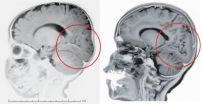(Press-News.org) A protective molecule has been identified in the brain which, if used artificially, may prevent brain damage from the likes of stroke, head injury and Alzheimer's.
By looking at what happens in the brain after an injury, new research has finally ended speculation over whether a key molecule, 'KCC2' causes brain cell death after an injury or prevents it. The finding, published today (16th May 2011) in The Journal of Physiology now opens the door to the development of artificial forms of the compound which could provide 'neuroprotection' to those who have suffered a brain injury – to prevent further damage.
Lead author of the research Dr Igor Medina from the Université de la Méditerranée said: "Neuron damage can result from acute events such as stroke, epilepsy or head injury or by chronic degeneration found in Alzheimer's and Parkinson's.
"When brain tissue is damaged, cells often continue to die after the initial stimulus has stopped. So it is important to find a way of stopping this cascade of cell death."
KCC2 is known as a 'neuronal membrane transporter' and plays a valuable role in regulating brain cell growth and their connections with other neurons. Previous research has shown that the level of KCC2 drops drastically after the brain has been injured, but it was unknown whether this drop was causing the damage to the cells, or was decreasing because of it.
"The destiny of neurons in a damaged brain depends on a tiny equilibrium between pro-survival and pro-death signals. We wanted to know what KCC2 was signalling for – was it killing neurons or protecting them after an injury? Our study has found that KCC2 actually rescues the damaged cells."
The team studied damaged neurons from the hippocampus region of the brain, an area responsible for attention, spatial memory and navigation. They removed KCC2 altogether from damaged cells and found they died. But when they artificially increased the levels of KCC2 (by stimulating its expression using gene therapy), they found the damaged cells were protected from further damage, and death.
Dr Medina continued: "The death of neurons in the brain can be triggered by an imbalance of oxygen – known as oxidative damage, or where cells are incorrectly instructed to die by a neurotransmitter – a process known as excitotoxicity. KCC2 protects against both. It's really encouraging that we have identified a means of potentially protecting the brain from these common conditions."
Now the protective function of KCC2 is known, scientists can look at ways to maintain its levels in the brains of injured patients and prevent the cascade of damage that occurs. This could be achieved pharmaceutically, to naturally increase the levels of KCC2, or with gene therapy to introduce artificial KCC2.
"Neuroprotective agents that may stem from this research would benefit the victims of car crashes, stroke and those suffering with epilepsy, Parkinson's and Alzheimer's – it's a major focus for further studies," concluded Dr Medina.
### END
New understanding of brain chemistry could prevent brain damage after injury
2011-05-16
ELSE PRESS RELEASES FROM THIS DATE:
Plasticity of hormonal response permits rapid gene expression reprogramming
2011-05-16
Gene expression is the process of converting the genetic information encoded in DNA into a final gene product such as a protein or any of several types of RNA. Scientists have long thought that the gene programs regulated by different physiological processes throughout the body are robustly pre-determined and relatively fixed for every specialized cell. But a new study by researchers from the University of California, San Diego School of Medicine reveals the unsuspected plasticity of some of these gene expression programs.
Their findings, to be published in the May 15 ...
LA Story from Posh Bingo
2011-05-16
Posh Bingo players have the chance to win a trip to Los Angleles. Talk about California Dreaming! The game which only costs GBP1 to play is happening at 9.45pm on Sunday 3 July. Then players have the chance to play for GBP2,500 holiday vouchers as well as GBP500 spending cash. That is GBP3,000 prize that almost seems too good to be true but at Posh Bingo a lot seems like that.
Pre-buy your GBP1 cards for the GBP3k L.A. game now! Or EARN cards into the game for every 500 L.A. points you accumulate!
You can also win cards to the games thanks to the accumulation of 500 ...
Scientists find new class of compounds with great potential for research and drug development
2011-05-16
Scientists from The Scripps Research Institute have identified a class of compounds that could be a boon to basic research and drug discovery.
In a new study, published online in Nature Chemical Biology on May 15, 2011, the researchers show the new compounds powerfully and selectively block the activity of a large and diverse group of enzymes known as "serine hydrolases." Previously discovered serine hydrolase-blocking compounds have been turned into drugs to treat obesity, diabetes, and Alzheimer's disease, and are currently in testing as treatments for pain, anxiety, ...
Next generation gamers: Computer games aid recovery from stroke
2011-05-16
Computer games are not just for kids. New research published in Journal of NeuroEngineering and Rehabilitation, a BioMed Central open access journal, shows that computer games can speed up and improve a patient's recovery from paralysis after a stroke.
It is often difficult for stroke victims to recover hand and arm movement, and 80-90% of sufferers still have problems six months later. Scientists in America looked at a group of people who had impaired use of one arm after a stroke and found that computer simulations and cutting edge techniques, used by the film industry ...
Fly Away Thanks to Wink Bingo
2011-05-16
Wink Bingo has a number of fantastic promotions running. The newest allows players the opportunity to get away. Wink Bingo is giving its players the chance to fly away thanks to the GBP6k Fly Away game. In this game there are two chances to win the GBP2500 holiday vouchers and GBP500 spending money. You can play either in the Arrivals or the Departures Room. In the Arrivals room, players can't buy cards but can only earn free cards.
Every 500 points is good for one card and points can be earned in a variety of ways. Bingo on the Sunlounger pattern and that is good for ...
Exotic behavior when mechanical devices reach the nanoscale
2011-05-16
Most mechanical resonators damp (slow down) in a well-understood linear manner, but ground-breaking work by Prof. Adrian Bachtold and his research group at the Catalan Institute of Nanotechnology has shown that resonators formed from nanoscale graphene and carbon nanotubes exhibit nonlinear damping, opening up exciting possibilities for super-sensitive detectors of force or mass.
In an article to be published in Nature Nanotechnology (DOI - 10.1038/NNANO.2011.71), Prof. Bachtold and his co-researchers describe how they formed nano-scale resonators by suspending tiny graphene ...
Advanced-stage prostate cancer patients experience 20-year survival rates with surgery
2011-05-16
WASHINGTON — Long-term survival rates for patients with advanced prostate cancer suggest they can be good candidates for surgery, Mayo Clinic researchers have found. Their study found a 20-year survival rate for 80 percent of patients diagnosed with cancer that has potentially spread beyond the prostate, known as cT3 prostate cancer, and treated with radical prostatectomy, or surgery to remove the prostate gland. Previously, patients found to have cT3 prostate cancer were offered radiation or hormone treatment, but not radical prostatectomy.
The researchers presented ...
Tiny variation in 1 gene may have led to crucial changes in human brain
2011-05-16
The human brain has yet to explain the origin of one its defining features – the deep fissures and convolutions that increase its surface area and allow for rational and abstract thoughts.
An international collaboration of scientists from the Yale School of Medicine and Turkey may have discovered humanity's beneficiary – a tiny variation within a single gene that determines the formation of brain convolutions – they report online May 15 in the journal Nature Genetics.
A genetic analysis of a Turkish patient whose brain lacks the characteristic convolutions in part ...
$5000 Cash to be Won in Freerolls from PokerStars and RakeTheRake.com
2011-05-16
This week RakeTheRake.com offers online poker players another great promotion in celebration of its new site launch. There's $5000 cash to be won in two freerolls being hosted by PokerStars and RakeTheRake. This PokerStars promotion is one of many unique prizes being offered over the three months until the end of July 2011, in addition to the normal $500k+ of monthly promotions.
For a chance to win a share of the prize money from these freerolls, players will need to 'like' RakeTheRake on facebook or follow RakeTheRakecom on twitter and watch for the promotion posts. ...
Researchers identify DNA region linked to depression
2011-05-16
AUDIO:
Researchers have identified a DNA region on chromosome 3 that appears to be related to depression. the discovery was made independently by groups at Washington University School of Medicine in...
Click here for more information.
Researchers at Washington University School of Medicine in St. Louis and King's College London have independently identified DNA on chromosome 3 that appears to be related to depression.
Major depression affects approximately 20 percent of ...


